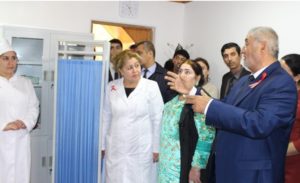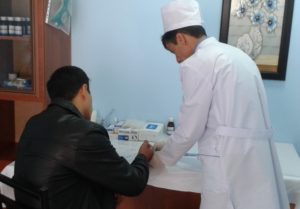 Voluntary counselling and rapid HIV testing points (VCT) on the premises of public organizations were opened in three more cities of Tajikistan – Dushanbe, Kulob and Khujand – on December 1, 2017. On this day, voluntary counselling and rapid HIV testing services were launched in public organizations Vita, SVON Plus and Amali nek.
Voluntary counselling and rapid HIV testing points (VCT) on the premises of public organizations were opened in three more cities of Tajikistan – Dushanbe, Kulob and Khujand – on December 1, 2017. On this day, voluntary counselling and rapid HIV testing services were launched in public organizations Vita, SVON Plus and Amali nek.
“Opening a VCT point on the premises of our organisation will undoubtedly increase the detection of HIV among the key populations. Our clients and AIDS centres are very much interested in this because the timely treatment will help them to save their health and life,” the director of the public organization Amali nek Abduholik Abdurakhmonov is saying.
Creating HIV voluntary counselling and rapid testing points, namely training of medical personnel, making the reparations, purchasing necessary furniture and equipment, became possible because of the project ‘Bridging the Gaps: Health and Rights for Key Populations 2.0’ and due to the regular consultations with AFEW-Tajikistan’s specialists.
“In 2015, AFEW-Tajikistan appealed to the Ministry of Health and Social Protection of the Republic of Tajikistan with a proposal to open a VCT point on the premises of the second office of our organisation in Khatlon region. This initiative was approved by the order of the Ministry and since October 2015, all HIV service organizations of the country had the opportunity to introduce the VCT service. Exactly one year ago, on December 1, 2016, the first point that provides voluntary counselling and rapid HIV testing service started its work in the city of Kurgan-Tube. It operates on the premises of our office in Khatlon region. Now our experience helps other public organizations to create and equip similar offices,” the project manager of AFEW-Tajikistan Dilshod Pulatov is sharing.
 In April and September 2017, in Qurghonteppa and Khujand, AFEW-Tajikistan organised a seminar and workshop to share the experience of the organisation on the introduction of VCT services on the premises of a public non-profit organization. The participants also studied the procedures for documenting and planning the costs for maintaining VCT points.
In April and September 2017, in Qurghonteppa and Khujand, AFEW-Tajikistan organised a seminar and workshop to share the experience of the organisation on the introduction of VCT services on the premises of a public non-profit organization. The participants also studied the procedures for documenting and planning the costs for maintaining VCT points.
“The seminar-meeting on the introduction of VCT service helped me to understand the main stages of work, what documentation is needed, what requirements for equipping the premises are, how to train staff and what the process of budgeting activities is to introduce VCT service,” the director of the Public Association VITA Eraj Nazarov is saying. “AFEW-Tajikistan helped us to renew the premises according to the necessary requirements, and also trained two of our medical workers for providing pre-test counselling and HIV testing services.”
During the opening ceremony of voluntary counselling and rapid HIV testing points, everyone had an opportunity to be counselled and tested for HIV.



